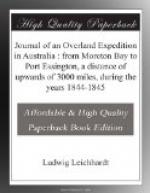May 24.—It was the Queen’s birth-day, and we celebrated it with what—as our only remaining luxury—we were accustomed to call a fat cake, made of four pounds of flour and some suet, which we had saved for the express purpose, and with a pot of sugared tea. We had for several months been without sugar, with the exception of about ten pounds, which was reserved for cases of illness and for festivals. So necessary does it appear to human nature to interrupt the monotony of life by marked days, on which we indulge in recollections of the past, or in meditations on the future, that we all enjoyed those days as much, and even more, than when surrounded with all the blessings of civilized society; although I am free to admit, that fat-cake and sugared tea in prospectu might induce us to watch with more eagerness for the approach of these days of feasting. There were, besides, several other facts interesting to the psychologist, which exhibited the influence of our solitary life, and the unity of our purpose, on our minds. During the early part of our journey, I had been carried back in my dreams to scenes of recent date, and into the society of men with whom I had lived shortly before starting on my expedition. As I proceeded on my journey, events of earlier date returned into my mind, with all the fantastic associations of a dream; and scenes of England, France, and Italy passed successively. Then came the recollections of my University life, of my parents and the members of my family; and, at last, the days of boyhood and of school—at one time as a boy afraid of the look of the master, and now with the independent feelings of the man, communicating to, and discussing with him the progress of my journey, the courses of the rivers I had found, and the possible advantages of my discoveries. At the latter part of the journey, I had, as it were, retraced the whole course of my life, and I was now, in my dreams, almost invariably in Sydney, canvassing for support, and imagining that, although I had left my camp, yet that I should return with new resources to carry us through the remainder of our journey. It was very remarkable, that all my companions were almost invariably anticipating the end of our journey, dreaming that they reached the sea-coast, and met with ships, or that they were in Port Essington and enjoying the pleasures of civilized life; whilst I, on awaking, found my party and my interests on the place where I had left them in my dreams. During the leisure moments of the day, or at the commencement of night, when seated at my fire, all my thoughts seemed riveted to the progress and success of my journey, and to the new objects we had met with during the day. I had then to compel myself to think of absent friends and past times, and the thought that they supposed me dead or unsuccessful in my enterprize, brought me back immediately to my favourite object. Much, indeed the greater portion, of my journey had been occupied in long reconnoitring rides; and he who is




